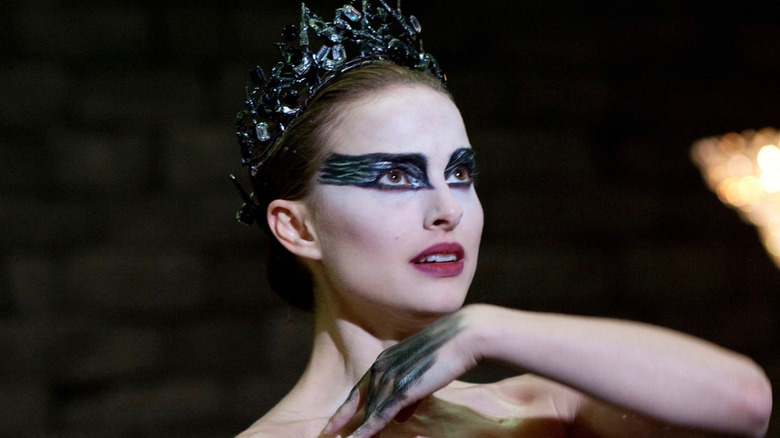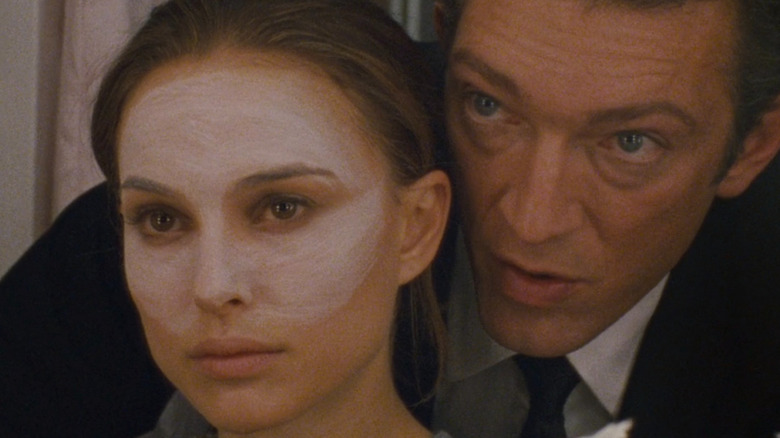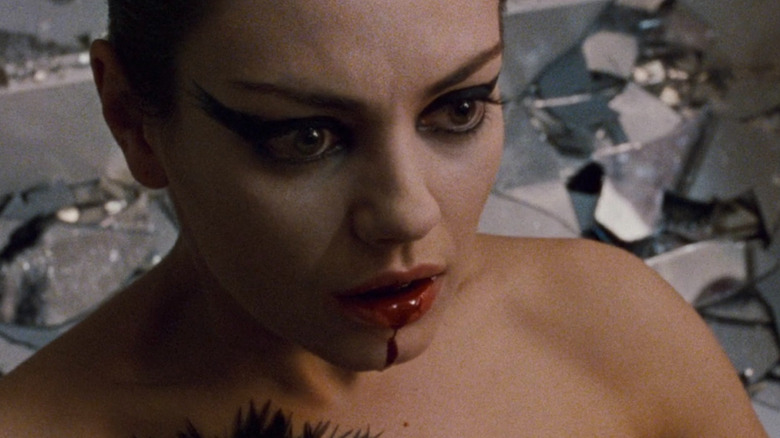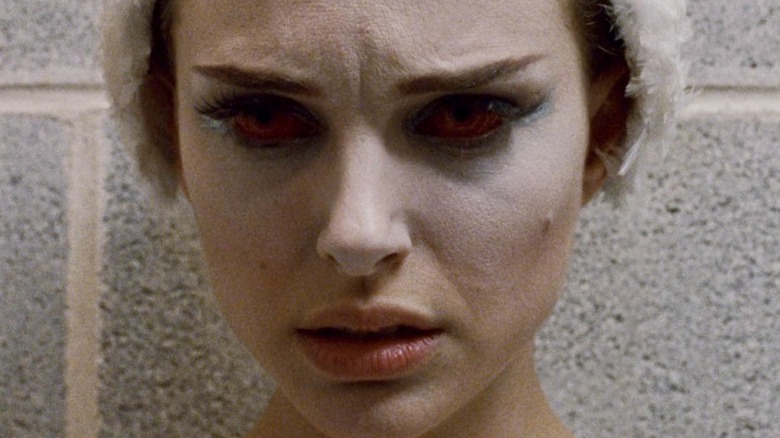Black Swan Ending Explained: A Dance On The Dark Side
This article contains spoilers for the ending of "Black Swan."
In Darren Aronofsky's "Black Swan," mirrors, windows, and other reflective surfaces abound. There are times when ballerina Nina Sayers (Natalie Portman in an Oscar-winning role) falls out of alignment with her own reflection while practicing in front of a mirror. There are other times still when Nina sees mirror images of herself in other people. On the train, she and Lily (Mila Kunis), another ballerina in the same Manhattan company, are depicted as plainclothes doubles, dressed in white and black, in keeping with the roles of the Swan Queen (or White Swan) and the Black Swan in Tchaikovsky's ballet "Swan Lake."
In the closing credits, Portman, Kunis, and other cast members are identified by both their character names in "Black Swan" and their analogous ballet roles in "Swan Lake." The movie is all about Nina getting in touch with her dark side — and indeed, making full-on love to it. It all leads up to an ending where Nina has to, as a character in the film puts it, "embody both swans, the White and the Black," onstage.
Like the drummer in "Whiplash," Nina is a perfectionist struggling to survive and thrive in a competitive performing arts environment where psychological warfare runs rampant. Since her perspective blurs the lines between hallucination and reality, we can't always trust what we see through her occasionally red swan eyes. Are people playing mind games with Nina, attempting to seduce and sabotage her, or is she just playing mind games with herself? The film builds up to her giving the ballet performance of her life, but that performance ends with a literal swan dive, and Nina may not live to enjoy it afterward.
A 'lustful twin' and warped prince
In the hall of mirrors that is "Black Swan," the supporting characters reflect aspects of Nina, whose support network is limited to her controlling mother, Erica (Barbara Hershey), and other members of the ballet company, like Lily and director Thomas Leroy (Vincent Cassel). Though Nina inhabits the same space as these characters, they may not have her best interests at heart.
Lily is a rival with questionable intentions. She superficially tries to befriend Nina but then sets her up for failure by taking her out clubbing and slipping ecstasy into her drink the night before an important rehearsal. Lily then becomes Nina's official alternate, or "understudy," per the script's original title. She comes close to usurping Nina's role, much like "the lustful twin, the Black Swan" (as Thomas describes them), tricking its way into the prince's heart in the ballet.
Thomas describes Lily's dance movements as "imprecise but effortless," contrasting her with Nina's over-controlled style, which she plainly inherited from her mother. "Perfection is not just about control," he tells Nina. "It's also about letting go." He wants to break down her boundaries, but his way of doing that is as suspect as Lily's friendship.
It's implied through Winona Ryder's character, Beth ("The Dying Swan"), that Thomas has a history of grooming young women as his lovers and lead ballerinas until they age out and he trades them in for a younger replacement. As he coaches Nina, the camera openly juxtaposes Thomas with her "prince," but he's a warped version of that stock fairytale character who abuses his position of power.
Hallucinations and self-destruction
In "Black Swan," which hit theaters in 2010, Natalie Portman has a scene where she summarizes the plot of "Swan Lake" for another guy at a nightclub, played by her future co-star in the Marvel Cinematic Universe, Sebastian Stan. She says "Swan Lake" is "about a girl who gets turned into a swan, and she needs love to break the spell, but her prince falls for the wrong girl, so she kills herself."
This is what happens to Nina as she descends into a whirlwind of hallucinations and self-destruction toward the end. The stage represents her public life, the moves she makes for everyone to see, while her dressing room takes us into the troubled private interiors of her mind. She thinks she has killed Lily and dragged her body out of sight in the dressing room. However, it turns out Lily is fine. In reality, Nina has stabbed herself in the abdomen with a shard of broken glass. Some of their relationship, including their hookup on the bed where Nina was shown masturbating earlier, appears to have been wholly imagined. It was more about Nina confronting her own dark side, what one of her ballet coaches likens to an "evil force" pulling her that she can't escape. As Thomas tells her, "The only person standing in your way is you."
When Nina first wins the role of the Swan Queen in the ballet, Thomas says, "I knew the White Swan wouldn't be a problem. The real work will be your metamorphosis into her evil twin." Nina's subsequent hallucinations allow the Black Swan to physically manifest itself in her in moments of body horror, though these are really just taking place in her mind.
Dancing the quiet part out loud
Through his rehearsal directions, Thomas guides Nina and us into her "final dance" and the "final act" of "Black Swan." He says, "You've tasted your dream, touched it, only to have it crushed. Your heart is broken, wounded, your life force fading. The blood drips ..."
We've heard Thomas couch his description of Beth's "dark impulses" in language that ensured Nina would relate it back to herself, even as he gaslit her and told her it had nothing to do with her. Now, Nina is more confident, and her own dark impulses are out in the open. Instead of just instinctively biting his lip in defense behind closed doors, she's ready to go on the offensive and threaten to cause Thomas more public controversy like he had with Beth. That way, he will let her take the stage as the Swan Queen, even though she overslept and arrived late (much like Lily did at the start of the movie).
Onstage, Nina sprouts feathers, and her dancing is no longer "frigid," as Thomas once described it. She also openly kisses him side stage in front of the other ballerinas. All throughout the movie, she's had visions of doppelgängers, not only in Lily's face but in Beth's. And the film's denouement seals her as the next Beth, with Thomas now calling her his "little princess," the pet name he used for Ryder's character.
By the end, Nina has mastered her performance, achieving twisted pirouettes of perfection as both the White and Black Swan, but it comes at the expense of her health and sanity and probably her life. Though a mattress cushions her final landing onstage, she is left bleeding out under a roar of applause before the movie fades to white.



